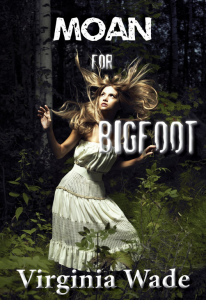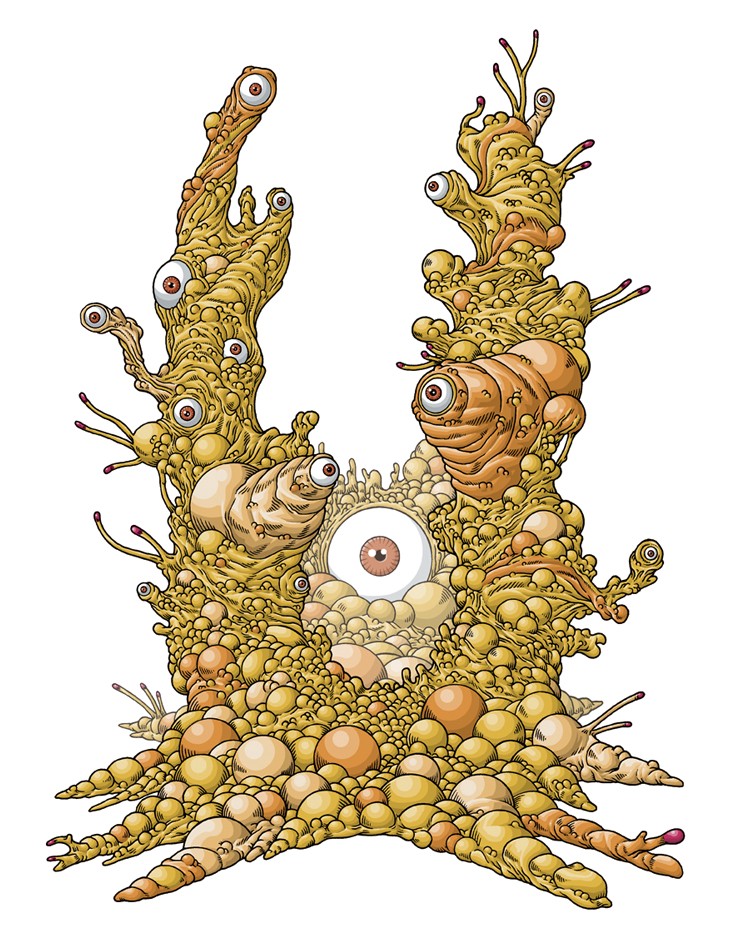interviews
INTERVIEW: WAX with Dolan Morgan

WAX asks authors to discuss a subject outside the world of writing that nevertheless fuels their writing life. Topics include: lessons learned from Repo Man with regard to atmosphere and place, the drone metal music that plays during writing time. The point is to witness a writer from an uncommon creative angle, and to revel in the excitement of an outsider’s point of view.
Today’s Subject: Dolan Morgan I first came across Dolan Morgan’s work via a published piece in Vol. 1 Brooklyn. The story, “Why the Things You Use Every Day Might Kill You #11: The Spoked Wheel That Turns Paper through a Dot Matrix Printer,” was strange and hilarious and vivid and unsettling. Yet it also contained a clear fascination with anachronistic technology, a heartfelt search for the pulse beating inside our junk. In this interview, we discuss hypothetical brochures to antique shop conferences, erotica projected through the lens of chemistry textbooks, and why you have to truly love the useless before you can use it as inspiration.

Screen grab of spam text received by Dolan Morgan
Matthew Thompson: When I first approached you for this interview, and inquired about sources of influence outside the world of literature, you provided this just incredible list…
Dolan Morgan: Ha, I think it was something like: spam, ads, pyramid schemes, outdated chemistry books, forgotten New Age hocus pocus, old newspaper accounts, self-help books, coupon circulars, and all manner of what might otherwise be considered junk.
MT: It sounds like the back room of a dusty antique shop. Are you attracted to these kinds of spaces as a writer? To collections of our disposed-of stuff?
DM: Yes and no. An antique shop, in fact, represents exactly what I’m not drawn to. That is, in order to qualify as merchandise for such a shop, an item has to be of some significant value. This value can be culturally determined or assigned by committee, but either way antique shops are the endpoint of a massive filtering system through which histories are passed. Only the ‘good stuff’ gets through. Or at least that’s the idea. It’s a bullshit idea, but that’s the idea.
MT: So not charmed by the ‘good stuff’…
DM: No. I’m more likely to be interested in the brochures for whatever Big National Conference antique sellers feel compelled to attend. Picture the pamphlet you might receive at this event’s registration: it exudes word-play, puns and clipart, but in a few hours will be trash, gone and forgotten. This kind of literature is all around us, and it’s not headed to the antique shop. I’m interested in this. I’m interested in what doesn’t pass through the filter. I’ll give you an example. One summer, when I was really struggling to get by, I took a job at a company that purported to improve website traffic for their clients. My job was to write an endless stream of blog posts related to these clients’ areas of business: everything from dryers, car maintenance, numismatics, catering, reclaimed auto-parts, asbestos abatement, event planning, emergency vehicle lighting equipment, to hotel supplies. We could write anything we wanted, so long as the post landed around 500 words and contained key terms linked to the client’s site. I did this all day. No one read the blogs. Not at all. Of course not. The blogs weren’t intended to be read, but instead were intended to look like they were intended to be read. Taken as a whole, this type of literature represents a massive trove of material, constantly being generated, and constantly influencing the world around us. We’re quite literally surrounded by it, and I reject the idea that the impact of this kind of ephemera is trivial.
MT: That’s an attractive take on ephemera, which, by its definition, is often dismissed as inconsequential. How do you see its impact upon the world as more than trivial?
DM: The cumulative effect of many small factors can make large-scale change. Isn’t that the very concept of democracy? Many little voices culminating in some big shift? I’ll give you a more sinister example: I once had a job at a polling company, a real wonky establishment that would soon be shut down for shady practices. I was 17ish at the time. Somewhere between 30–40 employees sat at computers and called home-phone after home-phone, all across the country, in the hopes of getting whoever answered to participate in a survey. These surveys varied day to day and the topics differed greatly. Often they dealt with an upcoming election, or with some kind of impending referendum. The surveys masqueraded as neutral attempts to gather information (for what purpose? what study? what authority? we weren’t told), but were anything but neutral. A typical question sequence might look something like this: 1) “if I told you politician X killed a man, would that make you more or less likely to vote for him?” followed by 2) “if I told you politician Y donated a billion dollars to a children’s hospital, would that make you more or less likely to vote for him?”
MT: I might have spoken to you once before…
DM: My apologies! Now, nobody likes this crap. It’s a nuisance, and no one will celebrate these surveys’ authors. But not for lack of impact. Millions of people have been on the receiving end of this literature — and it is a kind of literature. Someone writes it. Someone takes great care in writing it, in crafting it just so, wherever and whenever they can, moving from shady business to shady business, first above a Pilates center, then behind the storage facility, or maybe in a dentist’s basement. They’re the roving troubadours of our time, these data center polling auteurs, and they’ll remain equally unheralded and anonymous. Which might be a shame.
MT: That notion of anonymity is interesting. I’m curious if part of what draws you to said forgotten literature, in addition to the writing (which we’ll get to in a second), is the unnamed author behind each piece. The roving troubadours of data center questionnaires.Is there a flash of familiarity for you as a writer? A moment of sympathy shared over the solitude of writing? Or perhaps it is a kind of revulsion, an aspiration to be anything but forgotten?
DM: The hidden writers behind it all are not the most compelling part to me. (Likewise, the idea of writing-toward-immortality, or to escape obscurity, is very much not on my radar.) Rather, I’m compelled by the quiet way that ‘useless’ things accumulate and ultimately shape our lives, often in ways we struggle to recognize. I’m drawn to how objects intended for one purpose can incidentally contribute to another. In this way, pointing out the writer alone is a bit limiting — because a writer is just one of many peripheral lives that surround something useless or absurd.
MT: Let’s talk about how ‘useless’ things shape our lives. We’ve discussed the metaphysical effect these forgotten objects have on your approach to writing. I’m wondering how they physically influence your written work.
DM: The influence takes a lot of different forms. The first and most obvious one is structural. Things like self-help books, consumer guides, advice columns, textbooks, spam emails, and data collections contain their own unique organizational systems, and it’s a joy to shove narrative into those shapes, or to coil those parameters around a story. And, good lord, it’s not about gimmickry. Please. I can’t stress that enough. Rather, I honestly believe that there are important things hidden inside interoffice memos, astrology pamphlets, and unsolicited phone calls. Magic things. I believe that information about ourselves and the world around us, information that might otherwise go unseen, can be revealed and newly considered by inhabiting or invoking ephemeral forms. I’ll give you a kind of concrete example. For IMMATERIAL, the digital magazine arm of Marina Abramovic Institute, we recently sat down for a conversation with Jer Thorp, an amazing data visualization expert. He takes huge amounts of information and organizes it into gorgeous representations. One thing that really struck me during the conversation was Mr. Thorp balking at the idea of “dry” data sets. He explains that some peers pity him for being hired to work with eBay’s data, an immense collection. Boring!, they say, or, I’m sorry you have to deal with that. Yet Mr. Thorp cannot understand this view. A data set is not “dry,” he says. It cannot be. Because it represents an enormous sea of human experience, waiting to be found and expressed. Thorp invents ways to communicate those hidden pockets of humanity to others through graphic visualization and computer modeling, but I don’t think a writer’s task is very far off.
When I think, for example, about erotica told through the lens of a chemistry textbook, I don’t think, heh, what a joke, I think: what’s hidden here. What wants to be said. What wants to be heard. Most things in this world will never be said or heard, and there’s nothing we can do about that, but you take an infomercial, crack it open, and see what falls out. There’s something important in there, I promise. All of this crap piled up around us supports and forms the world we live in — all of these useless communiqués and reports create a kind of mold in which everything we believe in can exist — and we do a great disservice to ourselves by subtracting them wholesale from our stories and from our self-image. A person is just a shape in the middle of so much spam, an outline held together by so many bus routes and banner ads, a little hollow rendered clear by all the junk surrounding it.
MT: What you’re saying conjures this kind of primordial ooze feedback loop — a stinky swamp from which our personalities spring, and one to which we contribute via our own interests and peculiarities. Is there a particular story or poem we could examine that grew out of this pool of consumer guides, coupon circulars, old self-help books?

Moan for Bigfoot by Virginia Wade
DM: There are many. I wrote a series of small pieces modeled after the short-lived Google Places review system (which was replaced two years ago by Google+ Local). When people purchased copies of that work online, I threw their money away in the street and marked it on Google Maps. To commemorate the absurdity of this endeavor, I ceremoniously destroyed all of the pieces by smashing a tablet computer with a hammer at WORD Bookstore.
I just published a story in the style of monster erotica, a genre that is often dismissed and reviled (for good reason), and the story is influenced specifically by items like the Moan for Bigfoot series. Works in this genre are produced in high volume, like pulp novels of yore, often going under the literary radar, yet have reportedly earned authors upwards of $30,000 in a single month. Ah, the secret power of the useless!
I’ve got a chapbook coming out soon, co-written with Joe DeLuca, called Episodes and Commercial Interruptions, and the poems I contributed are all constructed using lines from the show “Mad Men.” That’s a popular show, so it might not seem like ephemera at first glance, but the majority of dialog in television shows washes over us like a river and just disappears. I don’t know where it goes, but of course this body of language also continues to live inside us somewhere. I come to the river to be baptized, or so they say, and it’s the same with television.
In my book, That’s When the Knives Come Down, there are two stories in particular that are enormously influenced by specific artifacts. The story, “Kiss My Annulus,” details one man’s journey into the heart of internet scams, and an entire section was inspired by a very peculiar spam email I once received. I’ve tried at length to find this email, but I fear I wisely deleted it. I truly regret trashing it because now I can’t reproduce it here for your pleasure, and because I think it was perhaps a once-in-a-lifetime, call-to-action kind of spam, the value of which I didn’t fully appreciate at the time. It contained a document, a PDF, that explained how to start your own spamming business, including all of the tools and methods you might want to use, broken into categories. It was a detailed invitation to become the man behind the curtain, and I incorporated much of the sentiments into the story, including the line, “there are a lot of hornies out there,” which was a kind of unbelievable crux to the document’s argument.

Cover of Sex and the Outer Planets by Barbara Watters (left), alongside Morgan’s upcoming collection,
That’s When the Knives Come Down (right)
Another story in the collection, “How to Have Sex on Other Planets,” was inspired largely by a used book that I found called Sex and the Outer Planets. When I took it home to read, I experienced grave disappointment that the book was not an exploration of sex on Jupiter, but instead a poorly argued social critique. I decided to, er, be the change I want to see in the world, and created the story I was hoping to have read. “How to Have Sex on Other Planets” incorporates actual language from the book and uses the overall structure as a general starting point, but it also takes influence from science texts, travel brochures, how-to guides and performance scores (the story is just directions for having sex on other planets).
MT: What strikes me while listening to you speak is gratitude. In most hands, this would be a gimmick; said artifacts would be employed facilely, with a smirking intellect behind the execution. Yet, with your work, I sense a deep appreciation for the source material. Are your stories and poems the conclusion to these disparate pieces, akin to a collage work built out of repurposed parts? Or is your writing a means of regeneration? Of continuation?
DM: I am grateful. Every source is a limitation, which is good for me because I’m terrible at freedom. Some writers flourish on the blank page, absorbing power from white space and unfettered options. Not me. If I go to clean my apartment, for example, and there are numerous paths I might take in order to get things tidy, I freeze up. I literally come to a stop and zone out, Lysol in hand. Friends find me standing in a doorway, blank-faced and slack-jawed, as if someone suddenly hit the Dolan off-switch. I just don’t know how to move forward with that many options and so I short circuit. I have to set up arbitrary structures to follow: socks first, loose change second, then papers/mail. Writing is the same thing for me, only worse. I enter a blank page and cease to exist. The experience for me is akin to time travel. I enter the computer and emerge silently in the future.
I function best within constraints and stupid limitations. I feel at home and find genuine pleasure in pushing against walls and constrictions. I like breaking rules, and you can’t break them if there aren’t any. Ads, spam, dismissed genres, how-to guides and brochures all provide such rules. These rules each amount to a kind of game that one can enter into and play. For me, the process is distinctly human: we recognize limitations or obstacles in the world and endeavor to circumvent or undo them. There’s great satisfaction in creating and reading works that mimic this process. It is inherently playful, yes, but I don’t think play is childish. Play is an almost spiritual undertaking. When we give ourselves over to a set of rules, or follow them to their conclusion (or engineer a way to use them in a manner beyond their initial intention), we access something new or even impossible. And this is where the gratitude and appreciation really comes in: you have to love or adore these useless things to truly participate in them without condescension. You can’t just put on a spam outfit and dance around, or say hey look at me with my funny pamphlet language. Then you’re an asshole. You have to really give yourself over to it. I had a teacher once who said: approach every text as if it is right and you are wrong. I try to do this with everything, but especially ephemera. There’s something quasi-religious about it — you dive into an absurdity, something that doesn’t necessarily make any sense to you, and see where the ritual takes you. Of course, people have always done this. We create traditions and iconographies that help us forego reason, and for a moment step outside the bounds of our everyday world. We often require sacred objects to help us do this, but I’ll argue that any old thing will suffice. You can take communion with a fax, break bread with a VHS tape, or transcend life with a phone bill. Each object is its own religion awaiting a congregation. And so I don’t think of my work as either a conclusion or even a continuation of source material, but rather an homage or meditation within a kind of pointless spirituality that doesn’t exist.
Dolan Morgan lives and writes in Greenpoint, Brooklyn, where he is an editor at The Atlas Review. His work has been featured in The Believer, Pank, Field, Contrary, TRNSFR and many others. His new book, That’s When the Knives Come Down, is out now from Aforementioned Productions. Find more at www.dolanmorgan.com.
[Editor’s note: Dolan Morgan’s story “Nuée Ardente” was published earlier this week in Electric Literature’s weekly fiction magazine, Recommended Reading.]









